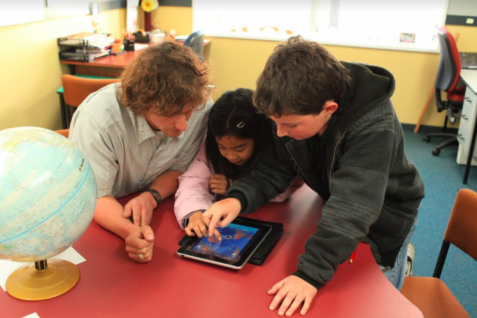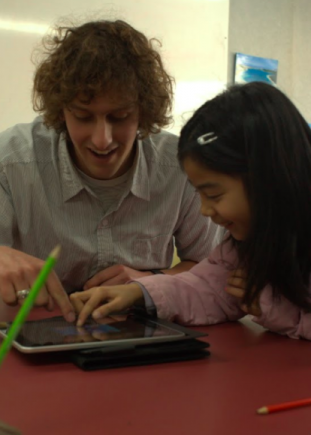Inclusion principle
"The curriculum is non-sexist, non-racist, and non-discriminatory; it ensures that students’ identities, languages, abilities, and talents are recognised and affirmed and that their learning needs are addressed."
The inclusion principle is one of eight principles in The New Zealand Curriculum that provide a foundation for schools' decision making. The inclusion principle calls for schools and teachers to deliver a curriculum that:
- celebrates the diverse abilities, languages, identities, and talents of every individual
- provides equitable learning opportunities
- recognises and meets the learning needs of all students.
Watch ...
Developing inclusive practice at Onslow College
John Robinson, HoD Learning Support at Onslow College, reflects on how inclusive practice is developing across the school. You can use the ideas in this video to review your own inclusive practices.
Knowing your learner to create an inclusive classroom
Teacher, Linda Ojala, describes how she designs learning that works for all students.
Read ...
Developing an inclusive classroom culture
Find four strategies that support the development of an inclusive classroom culture that values all students, their families/whānau, and communities.
Cultural diversity and inclusion
A 2012 report by the Education Review Office notes a close link between the inclusion principle and the cultural diversity principle. The report states that both of these principles require teachers to value students as individuals and celebrate the diversity that they bring. In inclusive schools, the curriculum is focused on meeting the diverse identities, needs, and interests of all learners in the school.
Mythbuster
The inclusion principle is not just about supporting students with special educational needs. It is about creating an inclusive school culture for everyone where the contributions of all students and their whānau are valued, barriers are minimised, and learning supports and flexibility are built into the environment at the outset. Inclusion of Māori learners - their identity, culture, and ways of being - is a key part of the inclusion principle.
Tools
Inclusive education: Guides for schools
This site contains a series of guides, which provide New Zealand educators with practical strategies, suggestions, and resources to support learners with diverse needs and encourage inclusion.
Wellbeing@School
This site supports schools to engage with the school community in a self-review process. The Inclusive Practices Tools explore the extent to which school practices are inclusive of all students.
Universal Design for Learning spotlight
Use this spotlight to explore the principles of Universal Design for Learning (UDL). UDL is an inclusive approach to teaching that helps educators plan and deliver programmes with all students in mind from the outset. Find short videos, group activities, and opportunities for personal reflection.
School stories
Inclusion from every angle
Manurewa Intermediate School in South Auckland approaches inclusion from every angle, looking not only at how to make students feel included, but also staff and whānau.
No exceptions, no problem!
Making a small change to a game can mean a big difference to ensuring all students can participate. Halberg Disability Sport Foundation No Exceptions Training programme has made a difference at Papatoetoe South Primary School by fostering the confidence to include all students in physical education.
Lindisfarne College
The development of the Gifted and Talented programme at Lindisfarne College is explained in this story. This includes working with students, engaging with parents and whānau, and reviewing practice.
Smooth transitions for students with special education needs
Students with special education needs experience positive transitions at the Mt Roskill campus thanks to the collaboration and close relationships between teachers, support staff, therapists, and parents.
Meeting the needs of all students
Kate Friedwald explains how she plans for inclusion of all students in her classroom learning programme. Teaching is based on students' specific needs and learning activities are differentiated and personalised for each learner.
A student’s perspective of inclusive education
Student Herepo Wynyard talks about how the involvement of her whānau, both online (through her e-portfolio), and face-to-face at school, has encouraged success with her learning goals.
Valuing what students and families bring to learning
Linda Ojala from Silverstream School explains the importance of knowing your learner and building on their interests, strengths, and home experiences in the classroom.
Classroom approaches – Dyslexia
Sandra Gillies, literacy Coordinator at Onslow College, explains the classroom approaches that best support students with dyslexia.
Resources
Why UDL is valuable
This CORE Education blog highlights the benefits of Universal Design for Learning.
Leadership in the development of inclusive school communities
Dr Jude McArthur gives an overview of the research she and others have undertaken in the schooling sector about the experiences of young people who have disabilities. She connects the key themes to what school leaders can do to support developing their schools as inclusive communities.
Creating culturally safe schools for Māori students
This article presents findings about ways to create culturally safe classrooms in New Zealand schools. In particular, it focuses on ways in which teachers and schools can create inclusive environments for Māori students.
Whose voices help to shape your local curriculum?
This blog provides ideas, questions, tools, and examples to help you design a local curriculum that reflects what is important to your community.
Ka Hikitia (the Māori Education Strategy, 2020)
Ka Hikitia sets out how the education sector will achieve system shifts and support Māori learners and their whānau, hapū, and iwi to achieve excellent and equitable outcomes. Ka Hikitia provides an organising framework for the actions that schools and supporting agencies will take.
Action Plan for Pacific Education 2020-2030
The Action Plan for Pacific Education 2020-2030 maps the Government’s commitment to transforming outcomes for Pacific learners and families and signals how early learning services, schools, and tertiary providers can achieve change for Pacific learners and their families.
Inclusive practices for students with special education needs in schools (March 2015)
This ERO report examines how well students with special education needs are included in New Zealand schools.
Inclusive education: Guides for schools
This site contains a series of guides, which provide New Zealand educators with practical strategies, suggestions, and resources to support learners with diverse needs and encourage inclusion.
Gifted Learners
This website provides ideas, advice, and resources to help you respond to the strengths, needs and interests of gifted and talented learners through personalised approaches to teaching and learning.
Success for all
Lynne Silcock from the Ministry of Education discusses how Universal Design for Learning theory and technology together can support success for all.
Using technology to include more students
Lynne Silcock, from the Ministry of Education, discusses inclusion in the classroom and what every teacher can do to assist more learners. Lynne talks about UDL, which is focused on developing curriculum materials to support all learners.
The inclusive classroom: Martyn Rouse interview
Education expert, Martyn Rouse points to the successes of inclusive classrooms and describes how these can be developed to provide the right support for young learners in this video.
Universal design for learning
Learning facilitator Chrissie Butler discusses Universal Design for Learning (UDL). UDL is a framework for looking at how we plan our goals, our teaching methods, the resources and materials we use, and the way we design assessments. UDL is based around three principles that ensure that there are options for all learners to have equal access to learning.
Ka Hikitia – Ka Hāpaitia | The Māori Education Strategy
In this interview, Wharehoka Wano discusses the importance of recognising identity and culture in all learners, connecting with community and including Māori learners in learning conversations around achievement.
Return to top





